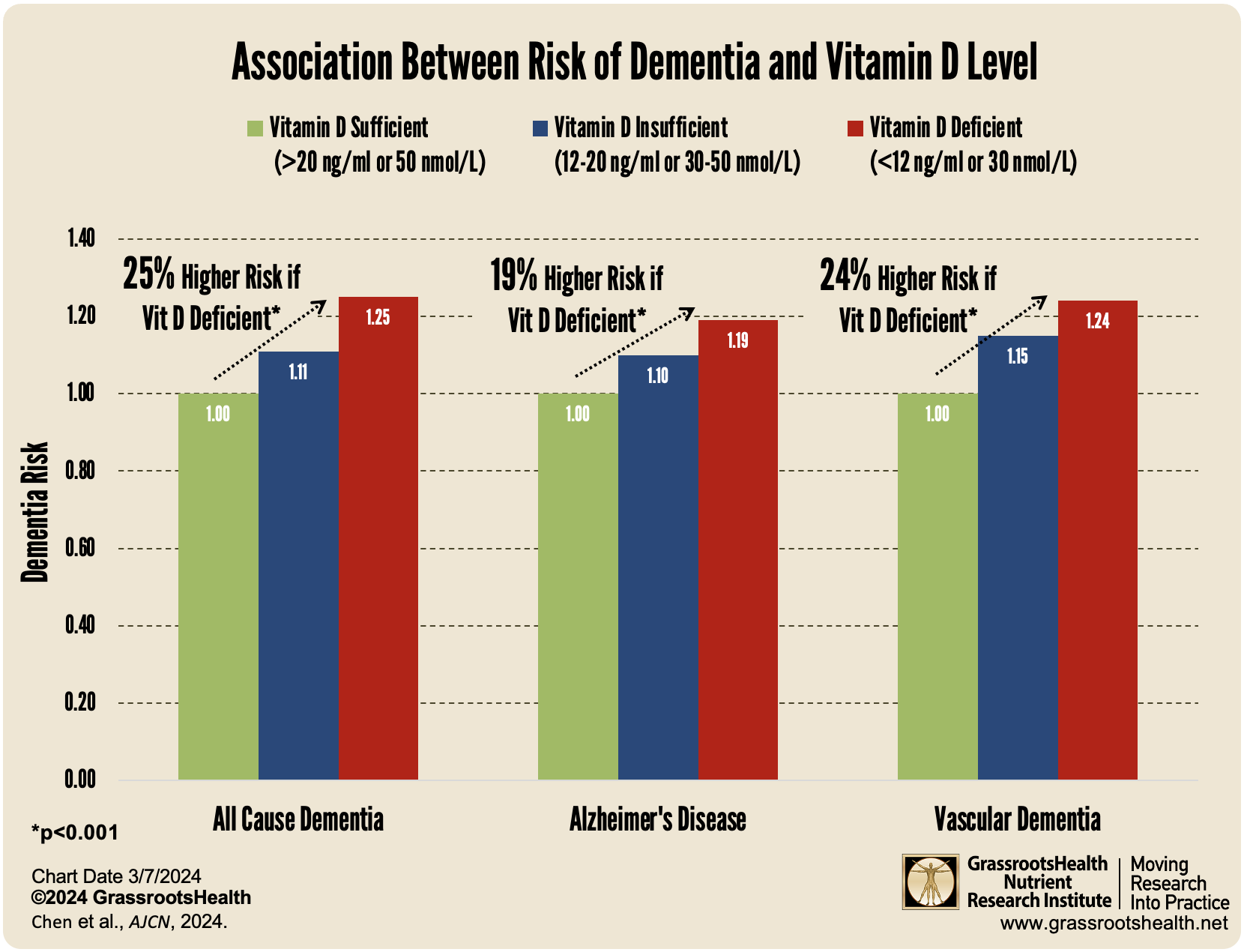Published on March 13, 2024
A new 2024 study finds up to 25% increased risk of dementia among adults with vitamin D deficiency; omega-3s are also important
Key Points
- A new study looked at data from 269,229 adults (ages 55 to 69 years old) to determine the relationship between vitamin D supplementation and vitamin D levels on the incidence of dementia over a 14-year period; types of dementia included all-cause dementia, Alzheimer’s Disease, and vascular dementia
- The study found a 19-25% increased risk of dementia among those with vitamin D deficiency, and a 10-15% increased risk among those with vitamin D insufficiency; findings for the increased risk among vitamin D deficient and insufficient participants were statistically significant for all three groups of dementia and remained significant when adjusting for variables
- Another study found that higher concentrations of omega-3s were related to better brain structure and cognitive function in middle-aged adults, with a significant association between a higher Omega-3 Index and larger hippocampal volume, as well as better abstract reasoning
How are Your Levels? Get 15% Off the Cognitive Health Test Kit with Code BRAINWEEK
 This week we are focusing our attention on brain health as part of Brain Awareness Week (March 11-17, 2024) – a week to foster public enthusiasm and support for brain science. To help you learn about how your status of certain nutrient and health markers may be affecting your brain, we are offering a Brain Week special. Measure your levels of vitamin D, omega-3s, hsCRP and HbA1c, all important factors affecting brain and cognitive health, with a special discount, now through this Sunday. Learn more about why these measurements are important for your brain health here.
This week we are focusing our attention on brain health as part of Brain Awareness Week (March 11-17, 2024) – a week to foster public enthusiasm and support for brain science. To help you learn about how your status of certain nutrient and health markers may be affecting your brain, we are offering a Brain Week special. Measure your levels of vitamin D, omega-3s, hsCRP and HbA1c, all important factors affecting brain and cognitive health, with a special discount, now through this Sunday. Learn more about why these measurements are important for your brain health here.
GET 15% OFF THE COGNITIVE HEALTH TEST KIT
Measure your vitamin D, Omega-3 Index, hsCRP and HbA1c
Use code BrainWeek
Hurry! This offer is available now until Sunday, March 17th, 2024 at 11.59PM PST.*
Order the Cognitive Health Test Kit – Get 15% Off with Code BRAINWEEK
Up to 25% Increased Risk of Dementia among Vitamin D Deficient Individuals
 A new study published this year (2024) by Chen et al. looked at data from 269,229 adults (ages 55 to 69 years old) to determine the relationship between vitamin D supplementation and vitamin D levels on the incidence of dementia over a 14-year period. Types of dementia included all-cause dementia, Alzheimer’s Disease, and vascular dementia.
A new study published this year (2024) by Chen et al. looked at data from 269,229 adults (ages 55 to 69 years old) to determine the relationship between vitamin D supplementation and vitamin D levels on the incidence of dementia over a 14-year period. Types of dementia included all-cause dementia, Alzheimer’s Disease, and vascular dementia.
Only 5% of participants reported taking vitamin D supplements, while nearly 20% reported taking a multivitamin. Over half (52.3%) of the participants had vitamin D levels below 20 ng/ml (50 nmol/L), with 18.3% deficient (defined as below 12 ng/ml or 30 nmol/L) and 34% insufficient (between 12-20 ng/ml or 30-50 nmol/L). The chances of vitamin D deficiency and insufficiency were lower among those taking supplements, however, vitamin D deficiency still occurred among 6.9% of those taking vitamin D and 9.5% of those taking multivitamins, compared to 21.5% of those who did not supplement.
Over the course of the study, a total of 7087 participants (2.6%) experienced all-cause dementia, 3616 of whom were diagnosed with Alzheimer’s disease and 1815 were diagnosed with vascular dementia.
The study found a 19-25% increased risk of dementia among those with vitamin D deficiency, and a 10-15% increased risk among those with vitamin D insufficiency. Findings for the increased risk among vitamin D deficient and insufficient participants were statistically significant for all three groups of dementia and remained significant when adjusting for variables.
Vitamin D Concentrations within Brain Tissue Significantly Related to Cognitive Health
A novel study by Shea et al. examined concentrations of vitamin D and its metabolites in the brains of 290 deceased individuals, all of whom had previously participated in the Rush Memory and Aging Project, a study tracking risk factors for Alzheimer’s Disease and cognitive decline. The goal was to determine if there was an association between cognitive function prior to death and vitamin D levels found in the brain tissue.
The researchers discovered that the main form of vitamin D measured in brain tissue was 25(OH)D3, with higher concentrations of 25(OH)D3 associated with a 25-33% significantly lower risk of dying with dementia or mild cognitive impairment. Higher vitamin D levels in the brain were also related to better global cognitive function scores, a slower rate of cognitive decline, and better semantic and working memory before death.
Higher Omega-3 Index Related to Increased Brain Volume and Better Cognitive Function
Another recent publication that has received a lot of attention is by Satizabal et al., which compared the concentration of omega-3 fatty acids EPA and DHA in the red blood cells (using the Omega-3 Index) to brain volume (measured by MRI) and cognitive function. The study included 2,183 dementia and stroke-free middle-aged participants, with a mean age of 46 years.
This study found that higher concentrations of omega-3s were related to better brain structure and cognitive function in middle-aged adults, with a significant association between a higher Omega-3 Index and larger hippocampal volume, as well as better abstract reasoning.
How do You Know if You Are Getting Enough Vitamin D and Omega-3s?
The only way to know is to test your levels! Testing versus blind supplementation is essential to know for sure if what you are taking is the right amount for you. Once you test your vitamin D level and Omega-3 Index and know where you are NOW, you can account for any upcoming changes in lifestyle over the coming months and adjust your intake to reach (or maintain) your target.
Check Your Levels Today
Do you know what your vitamin D level is? Check yours along with omega-3s, magnesium, zinc, and other levels today as part of the vitamin D*action project; add the Ratios for more about how to balance your Omega-3s and 6s!
Measure your:
- Vitamin D
- Magnesium PLUS Elements
- Omega-3 Fatty Acids
- hsCRP (for Inflammation)
- HbA1c (for Blood Sugar)
- and more
Did you know that each of the above can be measured at home using a simple blood spot test? As part of our ongoing research project, you can order your home blood spot test kit to get your levels, followed by education and steps to take to help you reach your optimal target levels. Start by enrolling and ordering your kit to measure each of the above important markers, and make sure you are getting enough of each to support better mood and wellbeing!
Build your custom kit here – be sure to include your Omega-3 Index along with your vitamin D.
Start Here to Measure Your Levels







